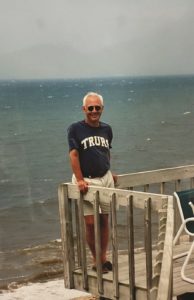Gerard Charles Wertkin of New York City and Truro died due to complications from Parkinson’s disease on Jan. 11, 2022 at Beacon Hospice Care in Hyannis. He was 81.
The son of Murray and Cecilia (Bregman) Wertkin, Gerry was born on Oct. 3, 1940 in Brooklyn, N.Y. He grew up in Queens and graduated from Martin Van Buren High School in 1958. He was always an avid reader, his wife, Barbara, said, “with unbounded curiosity.”
That curiosity led him to correspond with a pen pal in Liechtenstein, a correspondence that lasted until Gerry’s death.
Gerry earned his B.A. at Syracuse University in 1962, then two law degrees from New York University, in 1965 and 1970. He began a 15-year career in corporate law in 1965, the same year that he married Barbara Dansky. He was an associate with Saxe, Bacon and O’Shea until 1967; he worked next for the Kayser Roth Corp. before going into private practice.
While practicing law, Gerry began to study the last existing Shaker community at Sabbathday Lake, Maine. Barbara explained that Gerry “didn’t have an attorney’s soul; he was a creative man.”
When the Museum of Early American Folk Arts was negotiating with the community to put on an exhibition of its art and life, the Shakers recommended that Gerry be hired as curator. Then, in 1980, he became assistant director of the museum.
In 1991, he was appointed director of what had become the Museum of American Folk Art. During his directorship, the museum expanded both its physical space and its mission, “promoting an appreciation of diversity in a way that does not foster ethnic chauvinism or racial division,” Gerry wrote.
In 2001 the museum opened its own building at 45-47 53rd Street in Manhattan. The building, which won a World Architecture Award as the Best New Building in the World and the Municipal Arts Society’s Brendan Gill Award as the Best Building in New York City in 2002, helped solidify the museum’s growing international stature. As the New York Times put it in 2012, the Museum of American Folk Art is “one of New York City’s great treasures.”
Gerry did much more than manage the museum during a period of growth; he contributed to the scholarly work that defined the relationship between institutions like museums and the valuation of folk art, the art of the people. His many publications reveal the range of his interests. His first book, co-authored with Norman Kleeblatt, The Jewish Heritage in American Folk Art; The Four Seasons of Shaker Life: An Intimate Portrait of the Community of Sabbathday Lake; and the foreword he wrote for an illustrated edition of a book of essays by Amiri Baraka, taken together with his many other publications, demonstrate how deep his commitment to diversity was. As editor of the Encyclopedia of American Folk Art, named by the American Libraries Association as one of the top 20 reference titles in 2004, Gerry solidified his place as a resource for students of folk art across the country.

Gerry was also a teacher, work that Barbara said he enjoyed the most. He taught in the Department of Folk-Art Studies at NYU from 1982 to 1990 before becoming adjunct associate professor there from 1990 until his retirement. He also served on the advisory committee for the Museum Professions Program at Seton Hall University. He was happiest, Barbara added, “when he taught Jewish folk art to rabbinical students at the Jewish Theological Seminary in Manhattan.”
As a member of numerous boards, Gerry’s support of the institutions that sustain American folk art and culture never wavered. He was honored as a Knight of the Order of Norwegian Merit for his contributions to Norwegian-American Folk Art.
When Gerry, Barbara, and their children began vacationing in Truro in 1991, Gerry became interested in Pine Grove Cemetery and other cemeteries in Truro and Wellfleet. Headstones, Barbara explained, “are really folk art,” and Gerry loved Truro so much that he would joke about his fantasy job as “commissioner of cemeteries.”
In 2006, Gerry and Barbara built a house in Truro, where they settled permanently in 2019. To the end, Barbara reported, Gerry was full of enthusiasm for life. “Even with Parkinson’s,” she said, “when music played, he would get up and dance.” In her lasting image of Gerry, he has a book in his hands, dancing in his library.
Gerry is survived by his wife, Barbara, of Truro; his children, Jennifer of Wellfleet, Andrew of Toronto, Canada, and Rebecca (Praveen Saxena) of New York City; his sister, Barbara Wertkin of Eastchester, N.Y.; grandchildren Emily, Jeremy, Mia, Sadie, and Benjamin; and great-grandson Bodhi.
The burial service in Westchester County was private. There is a private memorial planned for April in Truro.



